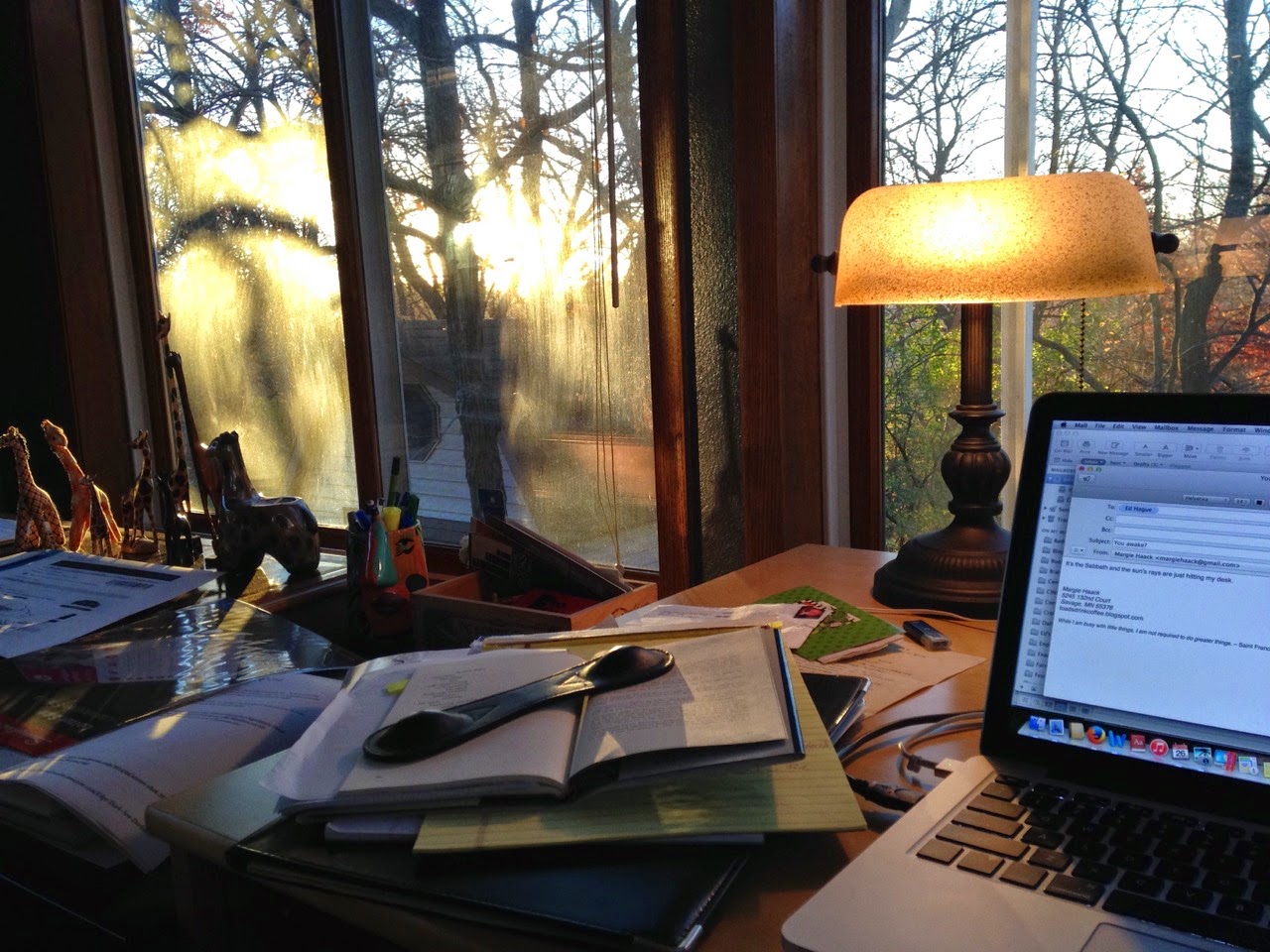Tuesday, December 30, 2014
Curating with gasps
I recently discovered the artist and writer Maira Kalman and
am utterly charmed. In the first glances at her work I wondered if I was
looking at a child’s art project because her drawings are folky and simple. But
what quickly emerges is cunning truth about the subject and a subtle humor that
reveals a mature hand behind the work. Her gift is to give you pause. To
reconsider what you nearly passed by, what you so quickly consigned to the trite
and ordinary, to pause for a minute and find unexpected meaning and/or beauty.
BrainPickings
describes her work as having: “a spartan sincerity … an elegantly choreographed
spontaneity – words meticulously chosen to be as simple as possible, yet
impossibly expressive; drawings that invoke childhood yet brim with the complex
awarenesses of a life lived long and wide.”
She has published a number of books but the one I discovered
first was My Favorite Things. I had
to get past the title – at first, all I
could hear was Julie Andrews droning on … “these are a few of my favorite
things… da-da, da, dah..” But the book quickly invites you to look at her list
and think in new categories. At the same time she asks the reader a serious question:
“How do you curate a life?” I ask, how do you curate your life? Or mine?
“…We begin with a portrait…” she writes.
In her hand-written, plain prose she tells us she has been
chosen to curate an exhibition for a small museum in New York City, the
Cooper-Hewitt National Design Museum, and what a dilemma it is to choose from
among centuries-worth of objects! Post cards from the Hotel Celeste in Tunisia.
Hats. A fragile vase carefully painted in red and green and signed – someone
loved it enough to keep it over a lifetime then pass it on.
This is why her work captured me: It struck me that her filter
is one through which we could all strain our own collections. She writes: “The
pieces I chose were based on ONE thing only – a gasp of DELIGHT.” Then she
asks, “Isn’t that the only way to CURATE a LIFE? To live among things that make
you GASP with delight?” (p. 9)
Of COURSE, not everything is going to make you gasp. What
inspires me may quietly turn you off.
(If you are kind you won’t mention it. And I promise your inspirations
won’t make me sign you up for an exorcism.) I began to realize that is why some
of the very things others pass over will make another “gasp with delight.” It
can be quite an individual matter. For example, I could see by the cover
illustration on her book that Kalman enjoys photos of dandies from the 1930s.
The way they dressed and paraded across the sand in their garish red and white
stripped suits on the beach at Coney Island looking all satisfied with
themselves. They make me smile.
I understand that not EVERYthing needs to make me gasp. I
don’t want to have an asthma attack when I climb into bed at night. I mean.
There needs to be calm scenes. Functionality. Quiet colors. Soft beds. Crisp
sheets. Most of my bedroom is not required to make me gasp. We understand. But
there are things I might now keep and others I may shed because she has named
this way of curating.
I am intrigued by possibilities. By a new way of thinking
about what everyday things can delight. What causes us to gasp? In this world
with so much that is broken, broken, broken, I wonder if we could keep some of
those good things, and also share a little. Like the annoying “Little Drummer
Boy,” (oops. I guess he’s not on my gasping list.) perhaps I can give you what
I have, which isn’t much, I admit. I can give what I write this year. I can
keep on trying to stay focused long enough to make something of it. If my
writing can cause you to, well, if not GASP with delight, but perhaps give a
slight twitch in your nucleus accumbens (look it up.) that would make me very
happy.
Wednesday, December 17, 2014
Work, writing, and dodging rotten fish
Tell me what made you think I’d want to read about what you
did yesterday? Your books didn’t arrive on the UPS truck when they were
supposed to and now all your orders are late? You need new socks because all
your old ones have holes? Waaa. Hearing about whatever it is you are up to is a
waste of my time. Throw rotten fish.
There is a person in my life who sits on my shoulder, watching,
someone who lifts an eyebrow and a corner of the lip while reading my
sentences. I sense a cynical vibe asking, why aren’t you doing something more
meaningful? Feeding the hungry? Something valuable. Perhaps you should clean
your closet or something. But stop this bushwa.
We (Denis & I) often talk about how every square inch of
life and reality belongs to the Lord Christ. That includes calling and vocation.
Part of my calling right now is writing. Working on another manuscript. Posting
to my blog. Writing my quarterly publication “Letters from the House Between.” Answering
mail. Even after all these years of understanding the importance of being
faithful in what you’ve been called to do today
and not imagining some big sensational save or Pulitzer Prize for your
astonishing work, I can have doubts about what I do.
This isn’t strictly a “Christian” problem; people who don’t
necessarily practice a faith also suffer from the guilt of living in a world
with so much misery and sorrow and trying to reckon the worth of what they do. Recently
I watched a 60 Minutes program about
Syrian refugees that was so heartbreaking I sat on the couch and bawled. How
could I be living in safety with a bowl of popcorn and a can of Coke while
thousands were escaping up a hill into a Jordanian refugee camp - their wounded bodies and hearts
repositories of violence – their faces pinched with starvation and fear – How
could I go about being a barista or a software developer or a writer? Especially a writer? (Opportunities to
help do abound. And we can find them. That is a good topic for another time.) But,
I’ve needed to reaffirm that it isn’t just okay, it is good to write.
Molly Wizenberg concludes her book Delancy: A Man, A Woman, ARestaurant, A Marriage by trying to work out their dilemma regarding the
significance of opening a restaurant and her choice to write.
“…when I decided to quit graduate school, I was newly broken
up with a boyfriend. He was a very kind, serious, thoughtful guy, someone who
tutors kids with severe learning disabilities in his free time. I remember
feeling so frivolous in comparison, so guilty, as I thought about giving up
academia to try being a food writer. Food writing wasn’t important. It wouldn’t
save a life. I did it anyway, because I wanted to, but I certainly couldn’t
justify it on the grounds of world peace. That justification doesn’t work for
opening a restaurant either. But there is something about Delancey that, to me,
matters just as much: We get to make people happy. We get to give people a good
night. We get to spend our days doing work that we can be proud of, and when
we’re done, there’s all the pizza you can eat.”
P 225.
What I do everyday does matter. It may not be worthy of a Ten Best Books list, but I know this is
what God has for me to do right now. If I listened too much to my doubts or to
that person who sits on my shoulder sifting my words, paralysis would set in. Wizenberg
may not be able to say “God has made me for this purpose” and understand that
because they are making the best pizzas they can and she is being a good food
writer honors God, but I can say it. He has created humans to live and work
before him and it pleases him to bless us however big or small, significant or
insignificant our work.
Subscribe to:
Posts (Atom)









